You are here
Back to topAU warns Sudan military, protesters make demands
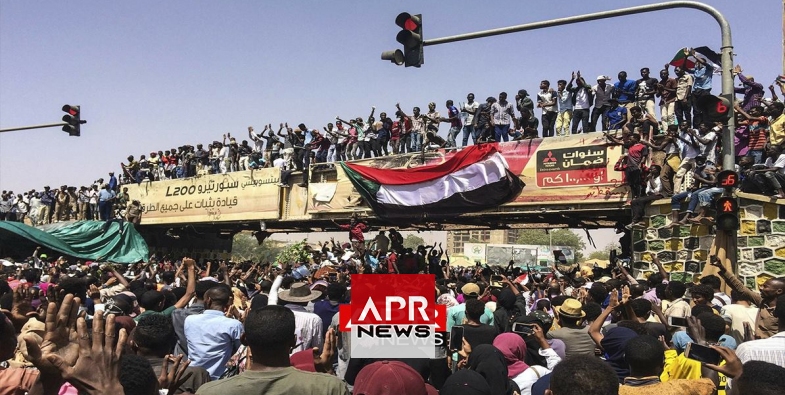
AU warns Sudan military, protesters make demands
APRNEWS - Standing with Sudan
Abdel Fattah al-Burhan, head of the TMC, received phone calls from the Saudi king, UAE president, Qatari emir, Ethiopian prime minister and South Sudanese president, SUNA said on Monday. They expressed support for the TMC in “this delicate and historic stage” and their concern for the security and stability of the country, SUNA said.
German Chancellor Angela Merkel called for “a rapid transfer of power to a civilian transitional government,” in a phone call with Egyptian President Abdel Fattah al-Sisi.
“This must be followed by a credible, inclusive political process that meets the expectations of the Sudanese people with regard to economic and political reforms,” her office said in a statement.
It has fallen, we won.
Sisi meanwhile reiterated Egypt’s support for “the brotherly Sudanese people’s will” and said Cairo would “not interfere in its internal affairs”, according to a presidential statement.
AU issues ultimatum to Sudan military
In a communique on Monday, the African Union’s Peace and Security Council called for Sudan’s military to transfer power to a “transitional civilian-led political authority” within 15 days or face suspension from the AU.
Lieutenant General Jalal al-Deen al-Sheikh, a member of the TMC, met Ethiopia’s prime minister in Addis Ababa, where the AU is based, and said, “We are already in the process of choosing a prime minister” for a civilian government, according to the Sudanese state news agency SUNA.
“So we are initiating this even before having this session with the African Union. This is our conviction and this is also the way forward to peace, but also, we respect it and we are committed to the decision of the Peace and Security Council.”
SPA makes demands
The Sudanese group that led protests against deposed President Omar al-Bashir called on Monday for the transitional military council that has taken power to be disbanded and for a new interim civilian ruling council to be formed.
Representatives of the Sudanese Professionals’ Association (SPA) piled pressure on the military commanders who have taken over, issuing a long list of demands for deeper and faster change to end repression and a ruinous economic crisis.
If their demands were not met, the group would press on with protests and not join a future transitional government, Ahmed al-Rabie, an SPA member, told Reuters.
The SPA held its first news conference since Bashir, who ruled with an autocratic hand since seizing power in a coup 30 years ago, was ousted by the military on Thursday following months of street demonstrations.
A new interim civilian body should be given full executive powers, with the armed forces having representation, and the Transitional Military Council (TMC) that took over last week should be dissolved, the SPA said.
“If our demand for the formation of a civilian transitional council with military representation is not met, we will not be part of the executive authority, the cabinet, and we will continue the mass escalation and the sit-ins to fulfil our demands,” Rabie told Reuters.
SPA representatives also renewed calls for the head of the judiciary and his deputies and public prosecutor to be removed. They demanded the dissolution of Bashir’s National Congress Party and said they received affirmation from the TMC that the party will not participate in a transitional government.
The SPA also called for the seizure of the party’s assets and the arrest of its prominent figures.
It demanded the dissolution of paramilitary groups that were loyal to the old government, and of the National Intelligence and Security Service’s (NISS) operations authority, and called for an end to Sudan’s press law and the public order law, which the SPA has said restricts freedoms.
April 15, 2019: Protesters assured of security, ex-govt members arrested
Some members of the erstwhile government have been arrested by the transitional military council, reports from the country has suggested as at Monday morning.
There has been no mention of the reasons why they were picked up and who exactly had been picked. Ousted Omar al-Bashir is currently in detention and is likely to face trial in Sudan.
Protesters who are holding an adamant sit-in entering two-weeks have also been assured of security by the military. As of Monday morning, protesters have block efforts by soldiers to remove road blocks according to reports.
The sit-in at the army headquarters in the capital, Khartoum, was the last straw that forced the military to oust President Omar al-Bashir last week.
Protesters have refused to leave until the military hands over power to a civilian-led transition team. The military high command has offered the protest leaders the opportunity to name a prime minister, Al Jazeera reported on Sunday.
April 14, 2019: Protesters to pick Prime Minister
The military council in charge of Sudan has asked activists to nominate an independent candidate for the position of Prime Minister in the transitional government, Al Jazeera reports.
The portal’s journalist covering the Sudan uprising confirmed that on day two of military – protester groups talks, the military said it was only interested in two security related portfolios.
“He said the military council only wants two positions, the defence and interior ministries. That’s because, in his words, they want to maintain order and security in the country,” Al Jazeera’s Hiba Morgan reports from Khartoum.
Morgan reported further that there were some disagreements among political parties in the duration and the shape that some of the measures expected to he undertaken.
“Now the political parties themselves are divided. Some of them want a two year transitional period, others want four. There’s also disagreement over how to deal with the national intelligence and security services. Some want it completely abolished while others want reforms,” she added.
Sudan’s new transition leader
Lieutenant General Abdel Fattah al-Burhan Abdelrahman is a military commander believed to be more ready to talk to the protesters.
He was the third most senior general in the Sudanese armed forces and is little known in public life. As head of Sudan’s ground forces he oversaw Sudanese troops fighting in the Saudi-led Yemen war and has close ties to senior Gulf military officials.
In his first televised address, Burhan said he was also canceling a night curfew ordered by his predecessor and ordered the release of all prisoners jailed under emergency laws put in place by ousted President Omar al-Bashir.
A coalition of groups leading the protests said it had accepted an invitation by the armed forces to meet on Saturday to discuss a new civilian government.
The main protest organiser had earlier on Saturday urged people to keep marching to demand a civilian government after the defence minister and the intelligence chief stepped down.
Intelligence chief resigns
Sudan’s security and intelligence chief quit on Saturday, state media reported, a day after the defence minister stepped down abruptly as interim leader following the overthrow of President Omar al-Bashir and protesters kept up demands for change.
Salah Abdallah Mohamed Saleh, known as Salah Gosh, who headed the National Intelligence and Security Service and was once the most influential person in the country after Bashir, was held responsible by protesters for the killing of demonstrators demanding an end to military rule.
The Sudanese Professionals Association (SPA), which has been leading protests to demand a civilian government, called for more demonstrations on Saturday.
“Today, we continue the march to finish the victory for our victorious revolution,” the SPA said in a statement.
“We assert that our revolution is continuing and will not retreat or deviate from its path until we achieve … our people’s legitimate demands of handing over power to a civilian government,” it said.
Defence minister resigns
Sudan’s defence minister stepped down abruptly on Friday as head of the country’s transitional ruling military council after only a day in the post, as protesters demanded quicker political change following President Omar al-Bashir’s ouster by the armed forces.
Hours after the military council sought to calm public anger by promising a new civilian government, Defence Minister Awad Ibn Auf said in a televised speech he was quitting as head of the council.
Lieutenant General Abdel Fattah al-Burhan Abdelrahman will be the new head of the council, Ibn Auf said. He also said Chief of Staff Kamal Abdelmarouf al-Mahi was relieved of his position as deputy head of the transitional military council.
“In order to ensure the cohesion of the security system, and the armed forces in particular, from cracks and strife, and relying on God, let us begin this path of change,” Ibn Auf said.
News of the change sparked joyful celebrations by many thousands in the streets of Khartoum as people chanted, “The second has fallen!” in reference to Bashir, witnesses said.
“What happened is a step in the right direction and is a bow to the will of the masses, and we have become closer to victory,” Rashid Saeed, a spokesman for the main protest group, the Sudanese Professionals Association (SPA), told Reuters.
“We are committed to our demands that we submitted to the army,” he said. “We call on the masses to stay on the streets until all the demands are met.”
16 killed during protests against military council
At least 16 people were killed and 20 injured by stray bullets at protests and sit-ins on Thursday and Friday, a police spokesman said.
Government buildings and private property were also attacked, spokesman Hashem Ali added.
Worshipers packed the streets around the Defence Ministry for Friday prayers, heeding a call by the SPA to challenge the military council.
The numbers swelled in the afternoon and a Reuters witness estimated hundreds of thousands of protesters thronged areas around the ministry, which was guarded by soldiers.
Hashem Ali asked citizens to help ensure safety and public order.
Military council pledges civilian government
Sudan’s ruling military council on Friday promised the country would have a new civilian government, a day after the armed forces overthrew President Omar al-Bashir after 30 years in power.
The council, which is now running Sudan under Defence Minister Mohammed Ahmed Awad Ibn Auf, said it expects a pre-election transition period it announced on Thursday to last two years at most or much less if chaos can be avoided.
The council also announced that it would not extradite Bashir to face allegations of genocide at the international war crimes court. Instead he would go on trial in Sudan.
Friday’s announcement of a civilian government by the head of the military council’s political committee, General Omar Zain al-Abideen, appeared aimed at reassuring demonstrators who took to the streets to warn against imposing army rule after Bashir’s overthrow.
‘Protesters, not army have solutions’
Abideen pledged that the military council would not interfere with the civilian government. However he said the defence and interior ministries would be under the council’s control.
He said the military council had no solutions to Sudan’s crisis and these would come from the protesters.
“We are the protectors of the demands of the people,” he said. “We are not greedy for power.”
Earlier on Friday, thousands of Sudanese demonstrators camped outside the defence ministry to push for a civilian government, defying a curfew and calling for mass prayers.
Demonstrators who have been holding almost daily anti-Bashir protests have rejected the decision to set up a transitional military council and vowed to continue protests until a civilian government is established.
Activists called for mass Friday prayers outside the defence ministry compound, a focal point for protests.
At the compound, large tents were put up and people brought in food and handed out water as the crowd swelled, a Reuters witness said. Ahmed al-Sadek, a 39-year-old trader, said he had not slept at his home since the sit-in began on Saturday.
Activists wearing yellow vests controlled traffic around the compound on Friday morning and managed foot traffic to and from the sit-in, a Reuters witness said. They also blocked a major bridge in central Khartoum.
Bashir, 75, had faced 16 weeks of demonstrations against him.
What next for protesters?
Thousands of people flocked to an anti-government protest outside the defence ministry on Thursday, while huge crowds took to the streets in central Khartoum, dancing and shouting anti-Bashir slogans. Protesters chanted: “It has fallen, we won.”
Demonstrators called for a civilian government and said they would not accept an administration led by military and security figures, or by Bashir’s aides.
Omar Saleh Sennar, a senior member of the Sudanese Professionals’ Association, one of the main protest groups, said it expected to negotiate with the military over a transfer of power.
“We will only accept a transitional civilian government,” Sennar told Reuters.
Names of Bashir’s possible successors that have been circulating include the defence Minister, an ex-military intelligence chief, also an Islamist, and former army chief of staff Emad al-Din Adawi.
Adawi is said to be favoured by regional neighbours at odds with Bashir over his Islamist leanings.
Bashir detained, military council takes over
Sudan’s defense minister said on Thursday that President Omar al-Bashir had been detained “in a safe place” and that a military council would run the country for a two-year transitional period, confirming a long anticipated coup by the armed forces.
In a statement broadcast on state TV Defense Minister Awad Mohamed Ahmed Ibn Auf said there would be elections at the end of the transitional period.
Seated on a gold-upholstered armchair, Auf announced a three-month state of emergency, a nationwide ceasefire and the suspension of the constitution. He also said Sudan’s air space would be closed for 24 hours and border crossings shut until further notice.
Sudanese sources told Reuters that Bashir was at the presidential residence under “heavy guard”. A son of Sadiq al-Mahdi, the head of the country’s main opposition Umma Party, told al-Hadath TV that Bashir was being held with “a number of leaders of the terrorist Muslim Brotherhood group”.
The defence minister made an appeal to the citizens, asking them to tolerate security measures that will be put in place. He also pledged that human rights will be observed throughout the transition period.
Photos: Celebrating the end of an era
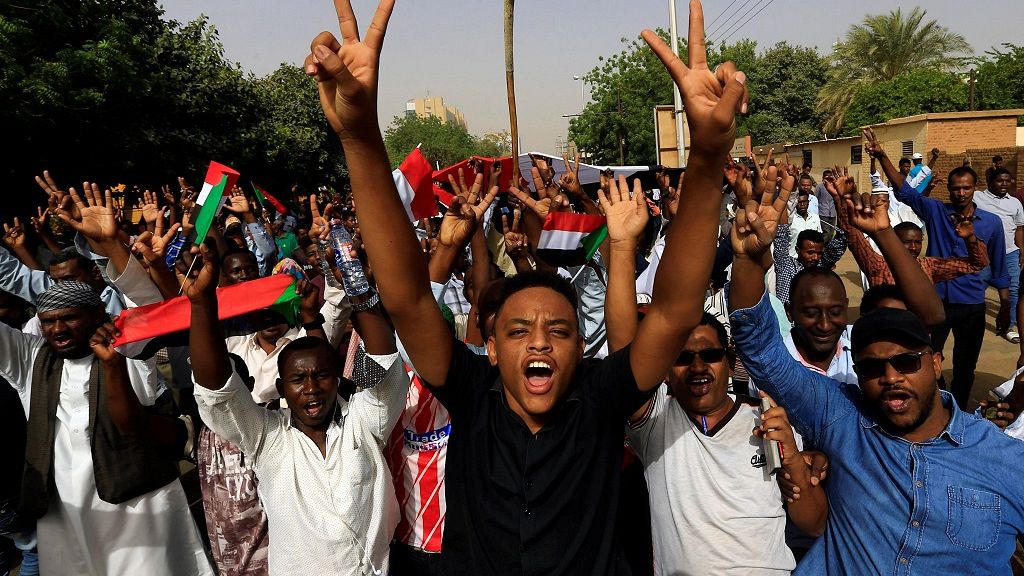
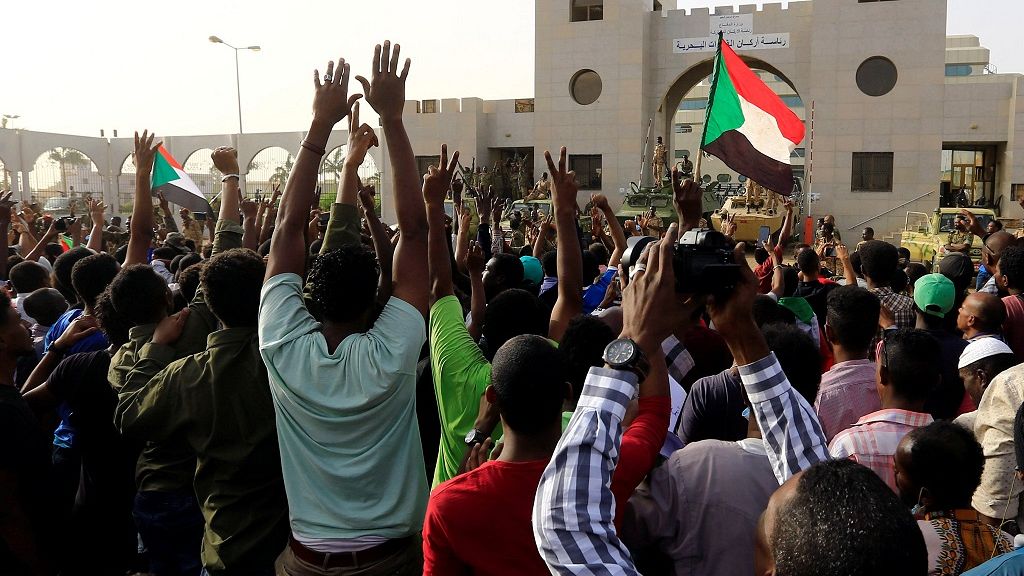
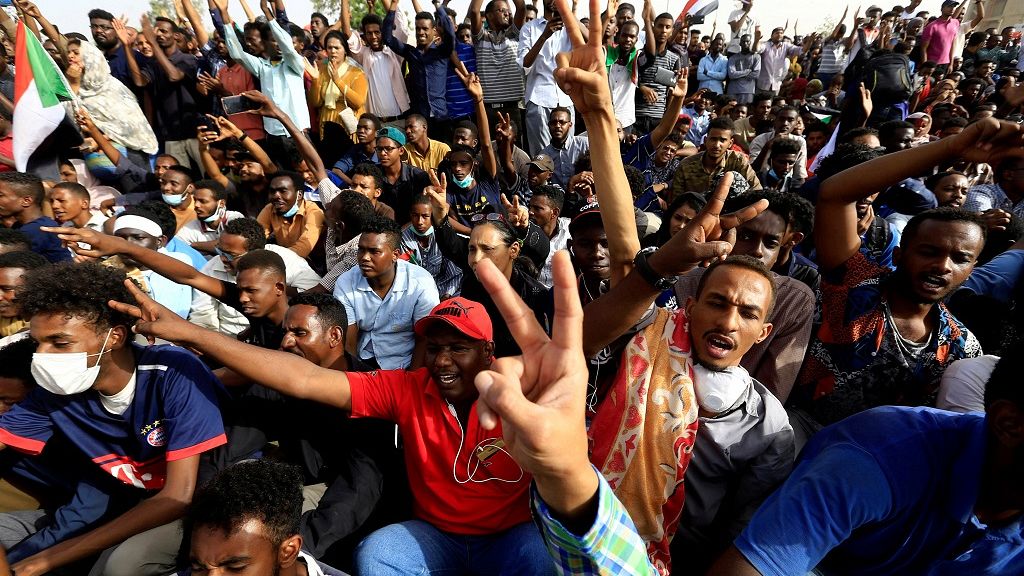
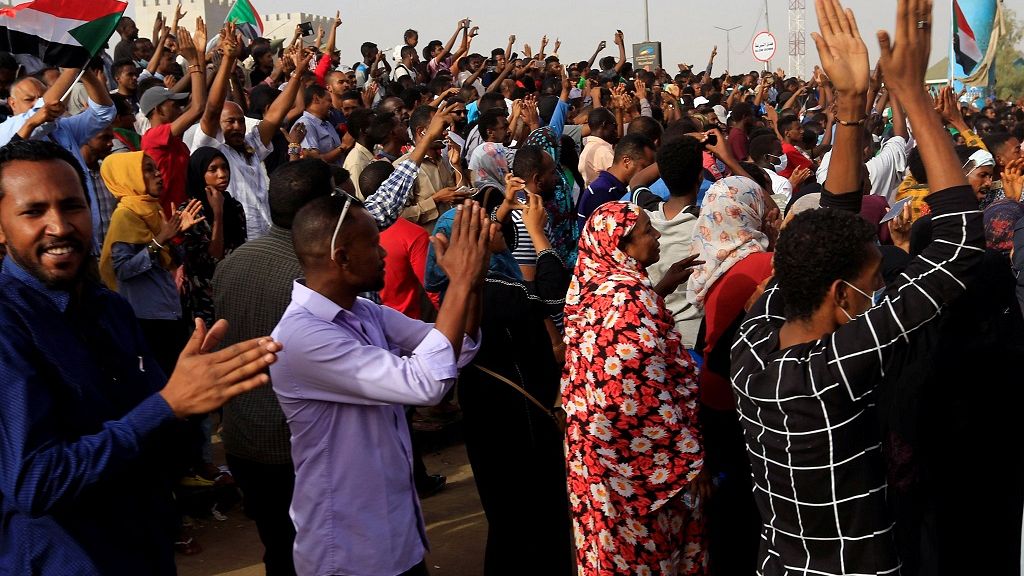
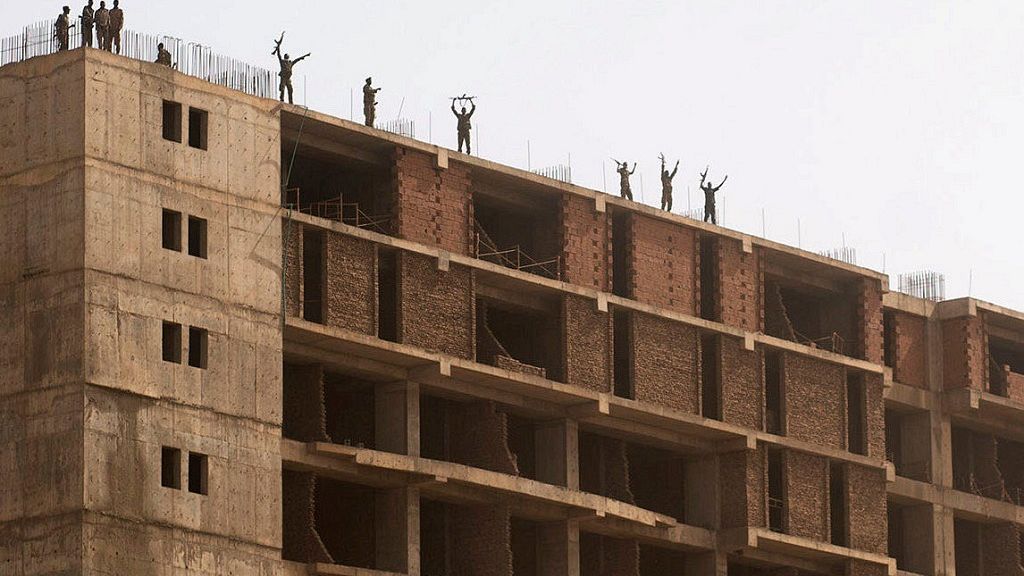
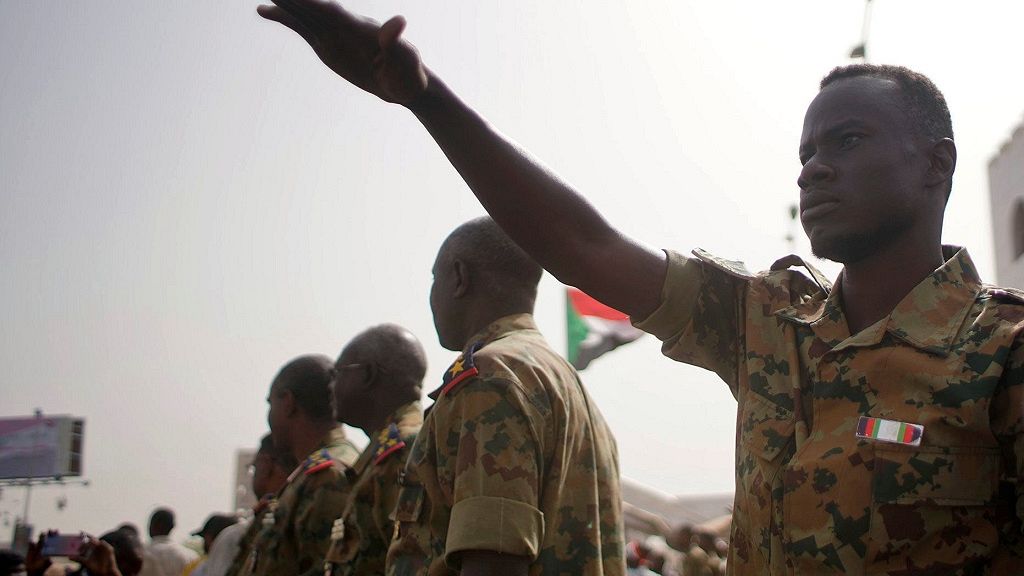
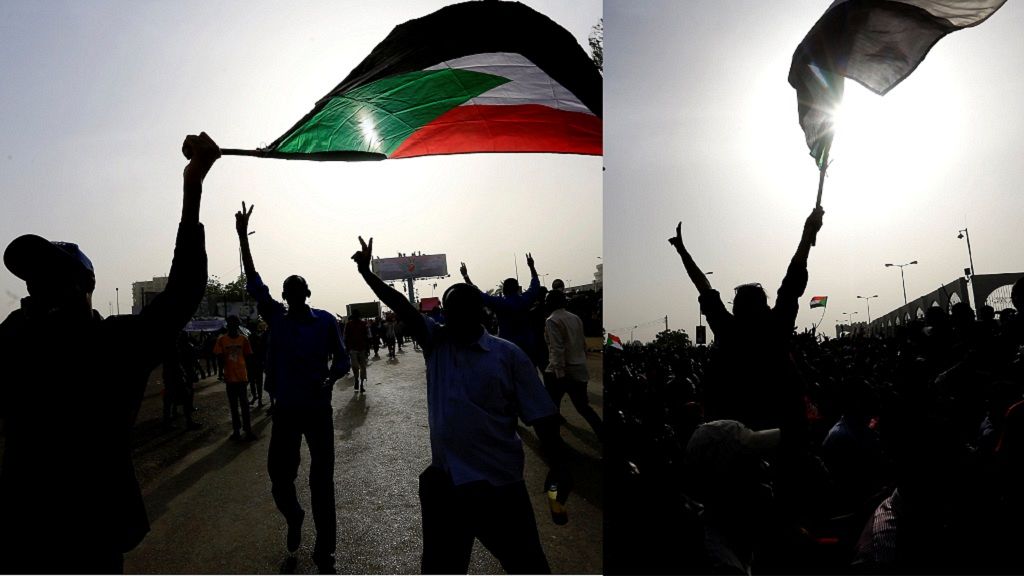
Political prisoners released
Sudan’s National Intelligence and Security Service has announced the release of all political prisoners across the country, state news agency SUNA reported on Thursday.
The announcement came after Sudanese sources said President Omar al-Bashir had been forced to step down after three decades in power.
Shortly after the announcement, Twitter users circulated photos showing former detainees being welcomed by protesters as they joined demonstrations against Omar al-Bashir.
One of those released was Mohammed Naji Elasam, a spokesman for the Sudanese Professionals Association (SPA), the main organiser of protests being held across Sudan since December, witnesses said. Elasam had been detained for more than three months.
Protesters vow to protect revolution from Bashir’s allies
The Sudanese Professionals Association (SPA), which has been leading protests that have lasted over three months, has urged the armed forces to ‘handover power to the people’, according to what they described as ‘the declaration of freedom and change’.
‘‘We assert that the people of Sudan will not accept anything less than a civil transitional authority composed of a patriotic group of experts who were not involved with the tyrannical regime,’‘ read part of a statement issued on their website on Thursday.
Omar Saleh Sennar, a senior member of the SPA said the group was waiting for a statement by the army and expected to negotiate with the military over a transfer of power away from Bashir.
Soldiers raid Bashir’s party headquarters
A Reuters witness says soldiers raided the headquarters of the Islamic movement led by Sudan’s Omar al-Bashir in the capital Khartoum on Thursday.
The Islamic movement is the main component of Sudan’s ruling party. Government sources said Bashir had stepped down and consultations were underway to form a transitional council.
Minister says Bashir has stepped down
Embattled Sudanese President Omar al-Bashir has stepped down and consultations are under way to form a transitional council to run the country, government sources and a provincial minister said on Thursday.
The minister of production and economic resources in North Darfur, Adel Mahjoub Hussein, told the Dubai-based al-Hadath TV that “there are consultations to form a military council to take over power after President Bashir stepped down”.
Sudanese sources confirmed the report and told Reuters Bashir was at the presidential residence under “heavy guard”.
Military to make announcement soon: state media
The military will make an announcement soon, state television said as troops were deployed in Khartoum.
“The armed forces will present an important statement shortly. Be ready for it,” the announcement on state television read, without giving further details.
The army and security services deployed troops around the defence ministry and on major roads and bridges in the capital as thousands of people flocked to an anti-government protest outside the ministry, a Reuters witness said.
Tens of thousands of Sudanese took to the streets in the centre of Khartoum in jubilation, dancing and chanting anti-Bashir slogans.
Protesters outside the defence ministry chanted: “It has fallen, we won.”
State television and radio played patriotic music, reminding older Sudanese of how military takeovers unfolded during previous episodes of civil unrest.
By Reuters







